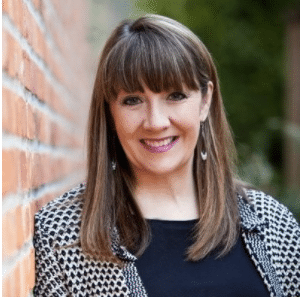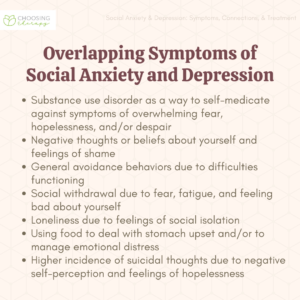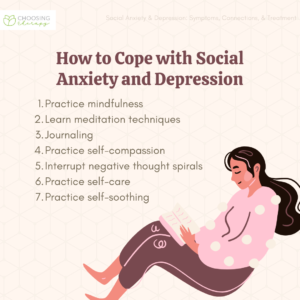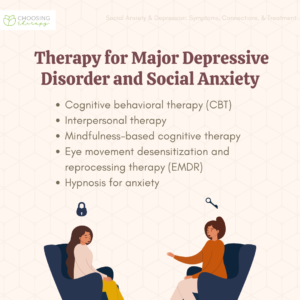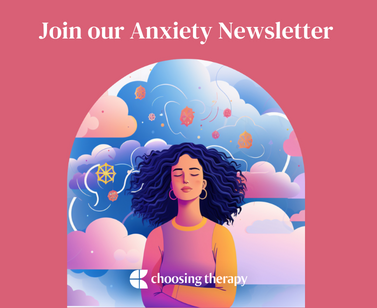Social anxiety and depression have several overlapping symptoms and often co-occur. If left untreated, they can cause significant distress and impairment in your ability to function – particularly in work, school, and social settings.1 Fortunately, several self-help strategies, therapies, and medications can help manage distress and reduce symptoms.
Would you like to have less anxiety?
Anxiety is treatable with therapy. BetterHelp has over 20,000 licensed therapists who provide convenient and affordable online therapy. BetterHelp starts at $65 per week. Take a Free Online Assessment and get matched with the right therapist for you.
Symptoms of Social Anxiety
Social anxiety disorder is characterized by a debilitating fear of social situations and the thought of being negatively judged by others. Within a 12-month period, anxiety statistics show that 7% of Americans will experience social anxiety disorder.2 Social anxiety is different from generalized anxiety disorder (GAD) and other types of anxiety disorders in that it is specific to social settings only.
Social anxiety might be confused with shyness or avoidant personality disorder. However, social anxiety goes beyond shyness as shyness is a personality trait (not a disorder) that is not necessarily as debilitating as social anxiety. Avoidant personality disorder (APV) presents with the same symptoms as social anxiety, but the symptoms are more severe and debilitating. Some suggest they are part of the same disorder.3
Common symptoms of social anxiety include:4,5
- Avoiding social settings
- Fast heart rate
- Panic attacks
- Anxiety tremors
- Avoiding eye contact
- Mind going blank
- Ruminating thoughts (i.e., repetitive thoughts, overthinking)
In addition to the above symptoms, symptoms of social anxiety in children might present as*:6
- Crying or tantrums
- Clinging to a caregiver
- Avoiding speaking
- Trying to seem invisible
- Fear or panic about going to school
- Fear of public speaking
*To be defined as social anxiety, these symptoms must present in situations with other children, and not only when the child is interacting with adults.
Symptoms of Depression
Symptoms of depression can cause physical, emotional, and spiritual distress. It can make it difficult for you to think clearly and can interfere with your ability to function in one or more areas of your life. It is estimated that in any given year, 10% of Americans suffer from a diagnosable mood disorder, including major depressive disorder, unipolar depression, dysthymia, or bipolar disorder).2
Common symptoms of depression include:6
- Sleep problems
- No appetite or overeating
- Feeling bad about yourself
- Concentration difficulties
- Anhedonia or Lack of motivation
- Hopelessness/Despair
Signs of depression in children might include:7
- Getting in trouble at school
- Irritability or throwing temper tantrums
- Marked changes in eating and/or sleeping patterns
- Sluggishness and/or lack of interest in doing things
- Self-injury or self-destructive behaviors
Options For Anxiety Treatment
Talk Therapy – Get help from a licensed therapist. Betterhelp offers online therapy starting at $65 per week. Free Assessment
Psychiatry for Anxiety – Looking for anxiety treatment that prioritizes you? Talkiatry can help. Find an in-network psychiatrist you can see online. Get started with our short assessment. Visit Talkiatry
Link Between Social Anxiety Disorder & Depression
Given that 50% of individuals with social anxiety also meet the criteria for a diagnosis of major depressive disorder,8 it is worth taking a closer look to understand more about depression versus anxiety and the overlapping symptoms of depression and anxiety. Moreover, it has been suggested that ongoing social isolation, as a result of social anxiety disorder, might result in the development of depression.6
Among individuals with social anxiety disorder, 81% report having at least one additional disorder, with the onset of social anxiety either preceding or occurring at the same time as the onset of other disorders.9
Social anxiety disorder significantly co-occurs with the following diagnoses:2,10
- Generalized anxiety disorder
- Post-traumatic stress disorder
- Eating disorders
- Substance use disorder
- Persistent depressive disorder (dysthymia)
How Do I Know If I Have Both Social Anxiety & Depression?
Social anxiety and depression have overlapping symptoms (e.g., avoidant behaviors, substance use, missed school/work, negative perceptions of yourself) which might lead you to wonder if you are dealing with both. What differentiates social anxiety from depression is the fact that social anxiety is a fear that is specific to social settings and how other people might judge you, while depression is not situation specific, but is characterized by overall low mood, energy, and interest/enjoyment, and a general feeling of hopelessness/despair.
Overlapping symptoms of social anxiety and depression might include:
- Substance use disorder as a way to self-medicate against symptoms of overwhelming fear, hopelessness, and/or despair
- Drinking alcohol to help anxiety symptoms
- Negative thoughts or beliefs about yourself and feelings of shame
- General avoidance behaviors due to difficulties functioning (i.e., in social situations, work or school)
- Social withdrawal due to fear, fatigue, and feeling bad about yourself.
- Loneliness due to feelings of social isolation
- Using food (i.e., not eating/overeating) to deal with stomach upset and/or to manage emotional distress
- Higher incidence of suicidal thoughts due to negative self-perception and feelings of hopelessness
Additional overlapping symptoms could include mental fatigue, negative self-talk, and negative thought spirals (e.g., catastrophic thinking).
Causes of Depression & Social Anxiety
There are several theories about why depression and social anxiety might co-occur together. Research suggests that the presence of social anxiety increases the risk of the subsequent development of depression. Theories further suggest that depression and anxiety co-occur due to biological, genetic, social, and/or environmental factors.
Possible causes of a dual diagnosis of depression and social anxiety might include:11,12,13
- Similar or shared neurobiological mechanisms underlying both disorders, which might cause both to be triggered simultaneously
- Overlapping symptoms result in a higher probability of dual diagnosis
- Experience of a stressful life event (e.g., childhood trauma) that triggers the emergence of both disorders
- Genetics – since both anxiety and depression have been found to run in families
How to Cope with Social Anxiety & Depression
Given the constellation of distressing and sometimes debilitating symptoms that can result from co-occurring social anxiety and depression, it is important to have a toolbox of coping strategies available to you. These strategies might allow you to better support yourself and manage or reduce some of the symptoms you experience.
Seven ways to cope with a dual-diagnosis of social anxiety and depression include:
1. Practice Mindfulness
Mindfulness for anxiety helps you to direct your focus on the present moment – rather than possible futures that you fear (i.e., due to anxiety) or are feeling hopeless about (i.e., due to depression). Focusing on the present can protect you from borrowing future distress related to situations that may never actually happen. It can also help you to allow your nervous system to experience the safety and calmness of a present moment that you might have otherwise missed.
One of the simplest ways to practice mindfulness for beginners is to notice three things you can see, three things you can hear, and three things you can touch. This helps you to stay in the present.
2. Learn Meditation Techniques
Meditation techniques might be helpful to you in reducing the severity of social anxiety and depressive symptoms. Meditation for depression and meditation for anxiety techniques can assist you in focusing your attention in specific ways (e.g., progressive body relaxation, guided imagery) to reset your nervous system, experience groundedness, and improve your overall sense of well-being.
3. Journaling
For those who enjoy writing, journaling can be a helpful way to make unconscious ideas and beliefs conscious so that you can identify, evaluate, and address those that are contributing to your distress. Journaling prompts for depression or journaling prompts for anxiety can also help you to externalize overwhelming or confusing thoughts and feelings (i.e., by placing them outside of you) to allow you to compassionately and more objectively understand yourself.
4. Practice Self-Compassion
What would it be like, if you treated yourself with the same level of compassion and kindness you showed others? If you had a loved one who was dealing with exactly what you are dealing with now, how would you show your support? What would you say? Treat yourself the way you would treat a loved one, and notice what this is like for you.
5. Interrupt Negative Thought Spirals
Social anxiety and depression can narrow your perceptions so that you perceive yourself and the world through a lens of fear and hopelessness. Catastrophizing, or imagining the worst things that can happen, can be a symptom.
When you find yourself in a negative thought spiral, you might want to try to interrupt and redirect it by using distraction, like texting a friend, watching a funny video, or reading a book. Mindfulness, or a self-soothing strategy like taking a hot shower or listening to a calming song can also help disrupt negative thought spirals.
6. Practice Self-Care
Self-care refers to actions you can engage in to support your overall well-being and help you live a balanced life. These activities might focus on one or more of the following areas of your life: emotional, physical, spiritual, financial, intellectual, social, financial, or environmental.
If you are feeling overwhelmed, start with the basics:
- Sleep or rest when you are tired
- Eat when you are hungry
- Go to the bathroom when you need to (rather than putting it off)
When people are struggling, these three basic self-care strategies are often ignored. If you honor these basic needs, you will tell yourself your needs matter.
7. Practice Self-Soothing
Self-soothing actions are focused on your senses and can be used to soothe and comfort yourself when you are feeling overwhelmed or dealing with distressing symptoms. Self-soothing activities can help you calm anxiety.
Common self-soothing activities include:
- looking at nature or a picture of a loved one
- listening to music or the sounds of nature
- wearing comfortable clothes or taking a hot shower
- breathing in the smells of nature
- eating your favorite meal or dessert
Find a supportive therapist who can help with anxiety.
BetterHelp has over 20,000 licensed therapists who provide convenient and affordable online therapy. BetterHelp starts at $65 per week. Take a Free Online Assessment and get matched with the right therapist for you.
Treatment for Major Depressive Disorder & Social Anxiety
Due to overlapping symptoms, social anxiety treatment and treatment for depression are often very similar. Both can be treated via therapy, medication, and lifestyle changes. For some people, natural remedies for anxiety might also provide some relief.
If you find that symptoms of depression and social anxiety are causing you distress and are making it difficult for you to function in one or more areas of your life, treatment is recommended. If your symptoms result in self-medication through substance/alcohol use and/or self-harm, or if you are experiencing suicidal ideation, obtaining professional support becomes more urgent.
Therapy
Anxiety therapy and therapy for depression can help you to better understand and normalize your symptoms.It can also help you to identify what is within your control (e.g., self-talk, behaviors) so that you can take steps to better support yourself and manage your symptoms, where possible. Your therapist might also be able to direct you to community resources and support.
Therapeutic interventions that may be helpful include:14,15
- Cognitive behavioral therapy (CBT): CBT for social anxiety and CBT for depression are considered the “gold standard treatment.” It involves identifying, challenging, and restructuring/changing unhelpful thoughts and behaviors.
- Interpersonal Therapy: This is a time-limited therapy in which your therapist works with you to identify how your depression and anxiety affect your relationships. This therapy focuses on behavior changes to improve social support and resolve symptoms.
- Mindfulness-Based Cognitive Therapy: Mindfulness techniques are taught to help you be with your thoughts, even those distressing, without getting involved with them. It teaches you to notice your thoughts, as you might notice clouds passing in the sky, without having an emotional reaction to them – and just allowing them to pass by.
- Eye movement desensitization and reprocessing therapy (EMDR): EMDR for depression is a therapeutic approach focuses on changing deep-seated negative beliefs about the self, which when worked through and shifted into more positive/adaptive beliefs, will decrease symptoms and increase your overall sense of well-being.
- Hypnosis for anxiety: With a clinical hypnotherapist, hypnosis can help you achieve a state of deep relaxation where your imagination and guided imagery can be used to practice new ways of responding to situations that would typically trigger social anxiety.
An online therapist directory or online therapy platform can help you find a therapist specializing in anxiety and depression using one of the therapeutic approaches indicated above.
Medication
Medication for depression The first-line treatment for co-occurring social anxiety and depression are typically antidepressants (SSRIs and SNRIs). (They are referred to as “antidepressants” because they were initially studied and assessed as medications for depression and were later found to work as effective medications for anxiety as well).
Commonly prescribed medications for social anxiety and depression include:14
- Antidepressants**– including SSRIs vs. SNRIs (e.g., Escitalopram, Fluvoxamine, Paroxetine, Sertraline, Venlafaxine) are considered first-line effective treatments for depression and social anxiety.
- Anticonvulsants – Preagabalin, specifically, is effective in treating social anxiety.
- Benzodiazepines* – such as Xanax, might be used to treat social anxiety if antidepressants are not working. Although benzodiazepines are effective in treating social anxiety, they are typically considered a second-line treatment because they also present the potential for abuse and dependency.
*Benzodiazepine medications carry a black box warning, the most serious kind of warnings from the FDA for abuse or misuse, risk of physical dependence and risk of serious side effects, including death, when combined with an opioid.
**SSRI and SNRI medication have a a black box warning, the most serious kind of warning from the FDA for a risk of suicidal thoughts and behaviors in certain people. You should talk with your doctor about these risks before starting this medication.
Two helpful resources when exploring medication for co-occurring depression and social anxiety are our articles on the best online psychiatrist services, and how to get anxiety medication.
Final Thoughts
Dealing with symptoms of both depression and anxiety can be difficult, but know that you are not alone. Effective treatments are available. Talking to a professional and/or sharing your challenges with a trusted loved one can be a good place to start.
Additional Resources
To help our readers take the next step in their mental health journey, Choosing Therapy has partnered with leaders in mental health and wellness. Choosing Therapy is compensated for marketing by the companies included below.
Talk Therapy
Online-Therapy.com – Get support and guidance from a licensed therapist. Online-Therapy.com provides 45 minutes weekly video sessions and unlimited text messaging with your therapist for only $64/week. Get Started
Virtual Psychiatry
Hims / Hers If you’re living with anxiety or depression, finding the right medication match may make all the difference. Connect with a licensed healthcare provider in just 12 – 48 hours. Explore FDA-approved treatment options and get free shipping, if prescribed. No insurance required. Get Started
Anxiety Newsletter
A free newsletter from Choosing Therapy for those impacted by anxiety. Get helpful tips and the latest information. Sign Up
Learn Mindfulness, Meditation, & Relaxation Techniques
Mindfulness.com – Change your life by practicing mindfulness. In a few minutes a day, you can start developing mindfulness and meditation skills. Free Trial
Choosing Therapy Directory
You can search for therapists by specialty, experience, insurance, or price, and location. Find a therapist today.
Online Anxiety Test A few questions from Talkiatry can help you understand your symptoms and give you a recommendation for what to do next. How Does ERP Help With Intrusive Thoughts? Obsessive compulsive disorder (OCD) is a psychiatric condition marked by the presence of obsessive thoughts, images, doubts, or urges, followed by compulsive behaviors or acts aimed at easing the distress caused by the obsession. While the content of the obsessions can take many forms, they are always repetitive, persistent, involuntary, and intrusive, and they often result in a great deal of anxiety for the person experiencing them.

Find a therapist for social anxiety
Get the help you need from a therapist near you
City or zip Search



